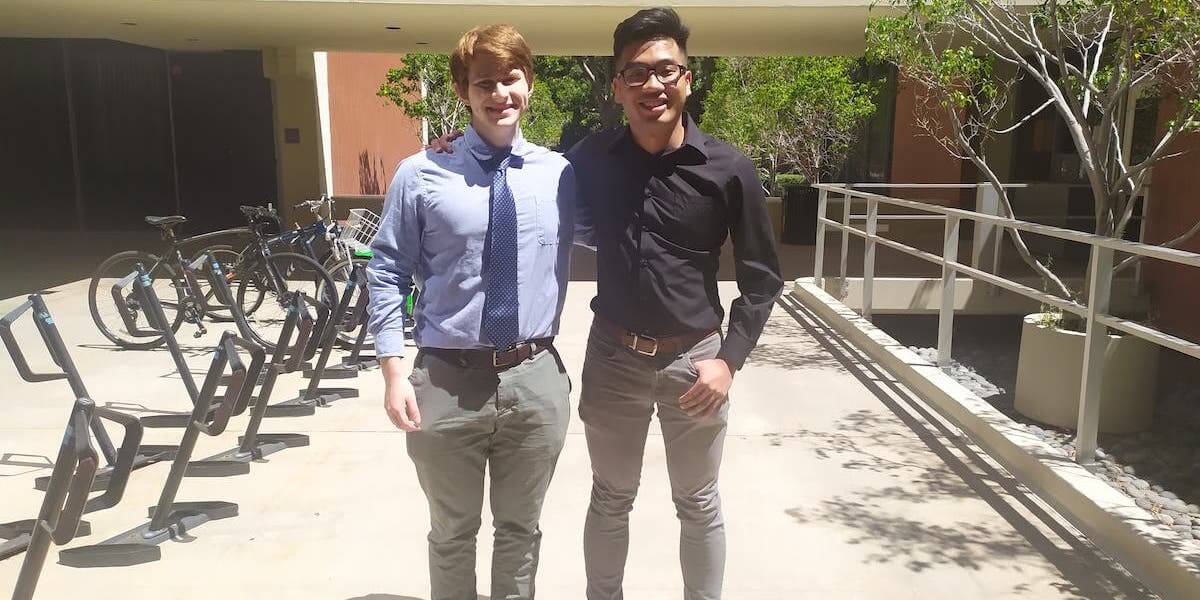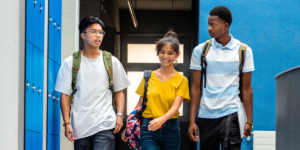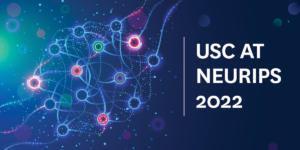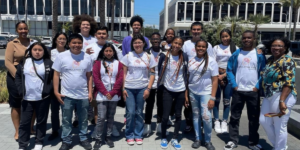
PHOTO/DUSTIN GOETZ. USC Viterbi SURE participants Marshall Basson and William Jo prepare to present their summer research.
The Trojan spirit was strong this summer, even among those just visiting. USC Viterbi School of Engineering’s SURE program provided an opportunity for undergraduates from around the country who are entering their junior or senior year to participate in cutting-edge research with top USC faculty—all for free. This year’s cohort just concluded their eight-week stint, presenting their work to faculty and advisors prior to returning to their own universities.
As a part of SURE, participants honed technical skills and gained exposure to graduate-level research alongside USC Viterbi faculty and Ph.D. students. The program aims to prepare students for the next step in their academic careers, while exposing them to USC Viterbi’s research community and academic resources. The program concluded August 1, with a final presentation of research conducted over the summer by program participants.
SURE participant Marshall Basson, a senior at Carleton College, said: “My experience this summer working in the Department of Aerospace and Mechanical Engineering has been fantastic. I have developed my skills in computational sciences and engineering greatly and performed high quality research with Professor Ivan Moreno-Bermejo, along with the other students in his laboratory. With this experience, I feel greatly prepared for future research in graduate study and beyond.”
William Jo, a senior at the University of Irvine, said his biggest takeaway was new knowledge on the tools available to do the work he is interested in. “It is my dream to work on computational fluid dynamic (CFD) simulations as a career, whether it may be in industry or academia, so applying to be a part of this research group for the summer was honestly a no brainer,” Jo said. “In my opinion, one of the aspects of being an engineer is knowing how things you use on a daily basis works rather than just treating it like a black box. This was a great opportunity to learn more about high performance computing, programming for computational fluid dynamic simulations and to overall get a feel of workflow in graduate/doctoral research.”
SURE research opportunities spanned USC Viterbi departments and topics such as algorithm fairness, robot autonomy, and automating data fact checks.
A few select projects included:
Marshall Basson, a senior from Carleton College, and William Jo, a senior from the University of Irvine, worked in the Department of Aerospace and Mechanical Engineering with Assistant Professor Ivan Bermejo-Moreno.
Basson tracked fluid particle trajectories in a turbulent—or chaotic—flow and how they were impacted when crossing a shockwave. Using the data he collected on thousands of particles, he worked to apply unsupervised learning to classify particle trajectories undergoing different types of events. This work will help better understand mixing and combustion processes that occur inside of scramjet engines, in supersonic flight applications and in supernova explosions.
Jo studied the evolution of a supersonic flow over a backward facing step through numerical simulation. This type of flow is commonly encountered in cavity flame-holders of scramjet engines. Jo also ventured into some meshing efforts on airfoils to speed up the overall turnaround time of production simulations.
Junior from Syracuse University, Allyson Karmazyn, worked in the Mork Family Department of Chemical Engineering and Materials Science, with WiSE Gabilan Assistant Professor Shaama Sharada and her team. Under the mentorship of PhD student, Zhenzhuo Lan, Karmazyn’s project involved using quantum mechanics to identify the significance of a commonly found ligand arrangement in monooxygenase enzymes. Sharada said the project was a significant step forward in helping us understand how to efficiently transform inert but useful compounds like natural gas.
Meanwhile, Kelly Lopez, a mechanical engineering sophomore at Seattle University and Samantha Wu, a bioengineering sophomore at the University of Pennsylvania worked on projects within the Daniel J Epstein Department of Industrial and Systems Engineering. Lopez and Wu worked with Professor Yong Chen’s group under the supervision of PhD student Huachao Mao.
Wu’s research focused on the development of a fast and high-quality 3D printing process. In this project, her task was to figure out the optimal parameter setting for a 3D printer; the challenge being that there are more than twenty parameters existing in the system. Wu was required to determine which parameters are significant and what values should be set.
Participants of SURE receive a $4500 stipend and receive free housing and travel to and from Los Angeles. The program typically admits 17-18 students annually.
Published on August 28th, 2019
Last updated on January 7th, 2021











